Deepavali 2015: How Singaporeans are celebrating the festival of lights
We ask a few Singaporean families to share more about how they celebrate the Deepavali and how their festive plans may have changed from past to present.
By Hong Xinying
The festival of lights (also known as Deepavali and Diwali) will be marked on November 10 in Singapore this year. As the occasion nears, these Singaporeans told Yahoo Singapore more about their Deepavali plans and how their festive habits may have changed over time.
The same customs continue
Some Hindu families and Singaporeans that Yahoo Singapore spoke to still stick closely to the rituals and traditions passed them from generation to generation.
Customs common to Hindu families with South Indian origins include waking up early for the oil bath cleansing ritual, morning prayers, blessings given by the elders as well as the temple visits.
Other festive activities such as dressing in new clothes and gathering for meals with traditional food tend to be similar for families with North Indian and South Indian ancestry. Homes will also be filled with lit diya oil lamps or with candles for Deepavali, though the specifics of other rituals and decorative habits may differ.
It’s not just the older generation of Singaporean Hindus who would keep to these practices. Civil servant Bavani Surya Varnan is proud to follow the rituals that her parents and grandparents have kept to.
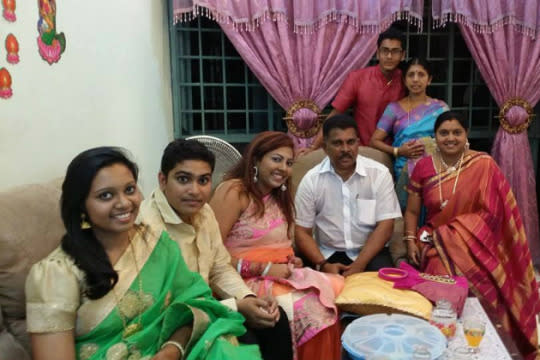
Bavani Surya Varnan (third from left) with her family. Image: Bavani Surya Varnan
The 29 year-old, who considers herself a devout Hindu, admitted that she used to “hate oil baths” as a child but she has come to appreciate these Deepavali customs. She hopes to teach her future children to do the same.
“When we were young, we don’t know the significance of Deepavali at all. It’s only over time when we do these rituals again and again that we come to really understand and appreciate them,” said Ms Bavani to Yahoo Singapore.
Festive shopping becomes an extensive yearly family affair for the civil servant, who said that “everything has to be new”, be it the traditional dresses or the undergarments. Her family’s festive clothing will all be tailored to fit, from the sari blouses to the punjabi suits.
“We don’t wear black and white on Deepavali as it’s considered inauspicious and we always opt for vibrant and colourful clothes,” explained Ms Bavani. “My mum will also apply turmeric paste, a sign of prosperity, to all four corners of our clothes.”
One common custom however, tends to change for Singaporean Hindus: the act of waking up right before sunrise, which is meant to mark a new beginning.
“It used to be this thing where we wake up very early in the morning but our busy lifestyles make it hard to do so,” explained Jane Franklin, a 30 year-old guest relations officer.
Her mother Mrs Clement Vijayalakshmi however, will still keep to the traditions that her family has followed.
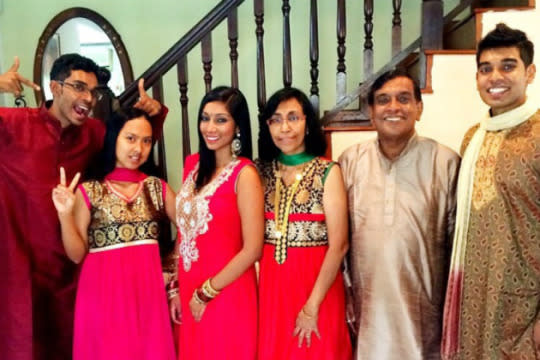
Mrs Clement Vijayalakshmi (centre) with her family. Image: Jane Franklin
“For me, Deepavali is still an important Hindu festival so I will still get up by 6am before the sun rises,” said the 60 year-old school teacher to Yahoo Singapore.
“I still cook biryani, make murukku for my family, my relatives will come all the way to our home for my cooking. We still do decorate our house with rangoli. We use tea candles now instead of oil lamps for convenience’s sake but we will still put candles in these little oil lamps,” explained Mrs Clement Vijayalakshmi.
A special occasion for newlyweds
For Hema Sivanathan, this year’s Deepavali will be particularly memorable. The Singaporean will celebrate her first Deepavali with her husband; the two wed in November 2014, after Deepavali last year.
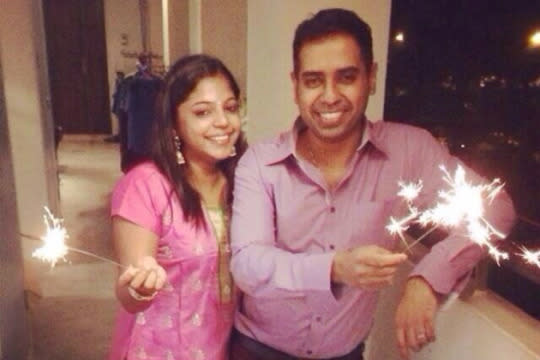
Hema Sivanathan with her husband pictured at Deepavali in 2014. Image: Hema Sivanathan
“For newlyweds like us, we will celebrate our first Deepavali together as Thalai Deepavali, which is a custom commonly observed in South India,” shared the counsellor.
According to Thalai Deepavali practices, the husband and wife will spend the eve of the festival in the bride’s family home. It’s an opportunity for the groom to meet and bond with the bride’s family.
On the day of Deepavali, the couple will celebrate at the bride’s family home with parents of the groom; for other years, the celebration will start at the groom’s family home instead. The bride’s mother would give the couple special gifts and clothes to wear on the same day.
“As a newly married woman, I have to start giving ‘ang baos’ (packets with monetary gifts) to my many nieces from this year too,” quipped the 32 year-old.
Her family also keeps to their endearing tradition of dressing to match every Deepavali.
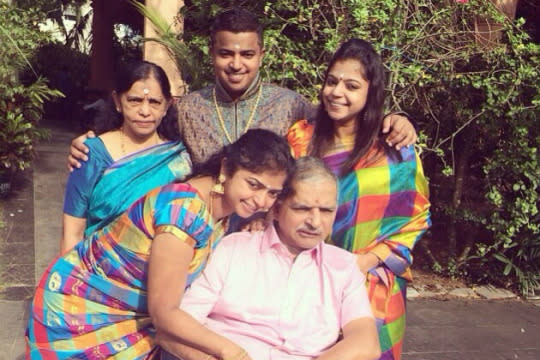
Hema Sivanathan (far right) and her family at Deepavali in 2014. Image: Hema Sivanathan
“My family always has colour themes for our Deepavali clothes every year,” shared Ms Hema. “This year’s theme is red, so everyone including my husband will try to dress in the same colour.”
More of a secular than religious celebration for others
For other Singaporean Hindus however, the religious importance and significance of Deepavali may have diminished over time.
“Our Deepavali celebration is pretty much a muted one with none of the trimmings of the traditional past,” shared lecturer Ramesh Loganathan.
Added the 55 year-old: “My family will probably just share a simple meal cooked together and consumed as a family. There are no new clothes, no going to the temple and no visiting of relatives.”
School teacher Indrajit Singh feels the same and sees the occasion more as a “social rather than religious celebration.” Deepavali house visits have also become less frequent for Mr Singh and his family.
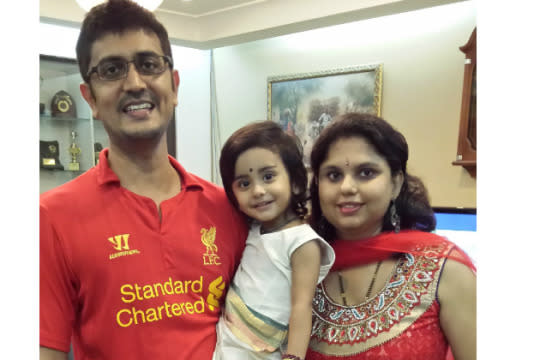
Indrajit Singh and his family at Deepavali in 2014. Image: Indrajit Singh
“I don’t feel much of a difference between Deepavali, Chinese New Year or Hari Raya as I do visit my Chinese and Malay friends during these festive periods,” said the 39 year-old. “Deepavali has just become one of such celebratory festivals in Singapore.”
The school teacher also remembers the “kampung” atmosphere about Deepavali from his youth, a neighbourly friendliness that might be now lacking in Singapore.
“In the past, we might even involve our neighbours in the festival, but these people have moved away,” recalled Mr Singh.
Ms Bavani agrees. Although the civil servant continues to invite huge groups of relatives, friends and colleagues to her home for Deepavali “over two to three weeks”, she might be hesitant to do the same for her neighbours.
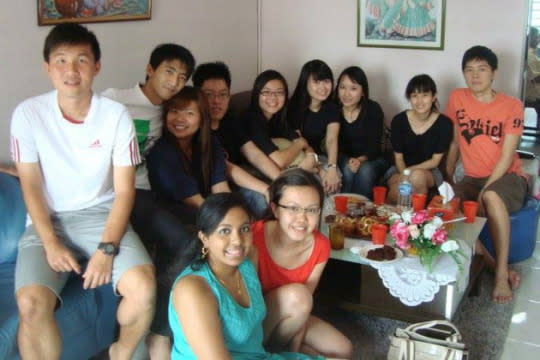
Civil servant Bavani Surya Varnan invites friends and colleagues to her home for Deepavali annually as a chance for them to taste “real Indian food”, as seen in this photo taken in 2014. Image: Bavani Surya Varnan
“During my parents’ kampung days, they would invite their neighbours over for Deepavali and give out cookies and sparklers to all of them. These days, we don’t even know our neighbours next door at all,” said Ms Bavani to Yahoo Singapore.
How some Singaporeans will celebrate Deepavali overseas
While there’s nothing like an at-home celebration, some Singaporeans abroad are looking forward to sharing the festive mood with their new friends and colleagues.
“This year, my friends and I plan to attend a few Deepavali get-togethers that some international students will be hosting,” said graduate student Sangeetha Madasamy, who is currently based in Boston.
Added the 27 year-old: “We might also have a potluck where all of us cook a dish for the special occasion and have dinner together.”
Human resources consultant Shobi Nathan, plans to continue celebrating Deepavali while working and living in Canberra, Australia. She has been living there for over eight years but has plans to move home in the future to start a family with her husband.
The 28 year-old will also be celebrating Deepavali a few days earlier on Saturday (Nov 7), as Australia does not have a designated public holiday for Deepavali.
“Although our Deepavali celebrations are low-key, my husband and I have our small circle of friends whom we celebrate the occasion with,” said Ms Shobi to Yahoo Singapore.
“I do miss celebrating the occasion with my family but we’ve established a circle of friends here to celebrate with as well.”
Of course, the feelings of homesickness can peak during the festive period, which is something that Singaporeans abroad like Ms Shobi acknowledge.
“I have many fond memories of celebrating Deepavali in my childhood. Perhaps I even took it for granted in one way or another,” shared Ms Shobi. “It’s been good here in Canberra but I do miss home.”
“Deepavali has always been about family, food, fun and tradition,“ explained Ms Shobi. It’s about the unity that families share when celebrating, as they let bygones be bygones while coming together for a day, in the midst of our busy lives.”

